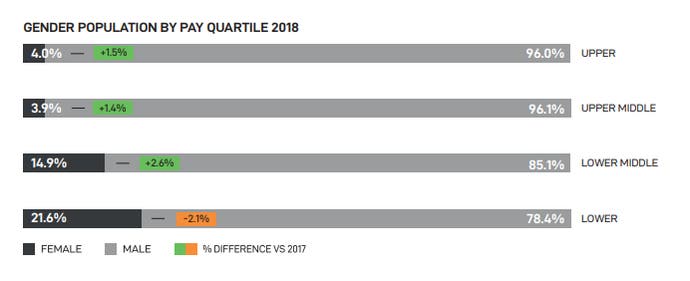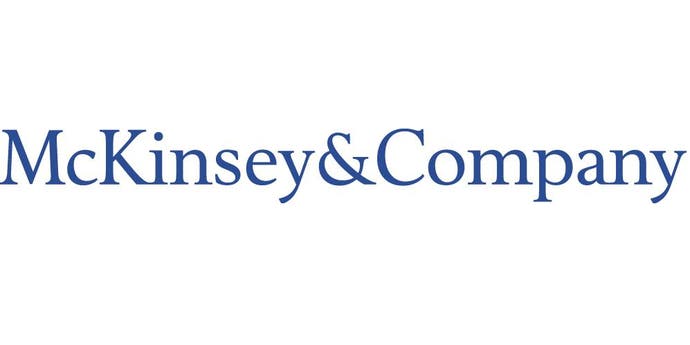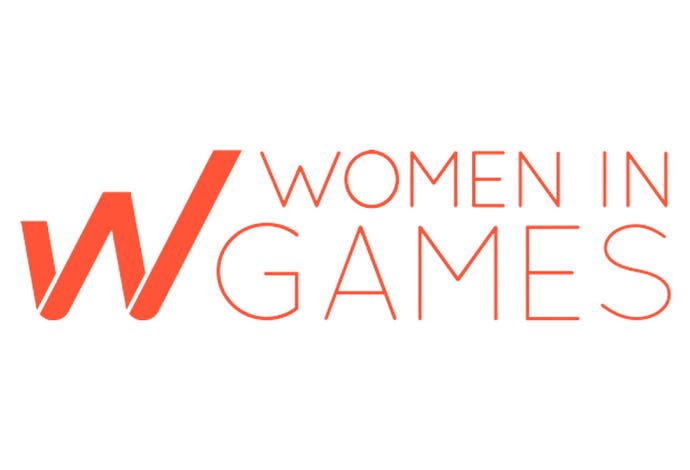UK games industry gender pay gap report shows progress, but companies must do more
"They could train more women to come into senior roles, which is something generally the industry is pretty crap at."
Last month, large game studios in the UK were required to submit their annual gender pay gap data for the second year since the government initiative began in 2018. It's the first time we've been able to compare statistics between years, and from a surface-level reading, things are not looking great. In the 19 biggest games-related companies in the UK, the overall median gap widened by 3.5 per cent, and the game industry's median wage gap of 18.8 per cent remains significantly higher than the national average of 9.6 (via GamesIndustry.biz).
It's only the second year of reporting, but the data still provides a chance to discuss progression (or lack of it) along with the specific areas companies need to focus on to improve the situation. And, while it may appear to be all gloom and doom, there are some positives. The games industry still gives women better bonuses than the UK average, with 56.3 per cent of women in games receiving bonuses compared to 34.5 per cent nationally. Somewhat encouragingly, diversity slightly increased across all pay quartiles.
Yet if we want to see significant change any time soon, it's clear companies need to do more.
So, what else can the stats tell us? First up, it's worth noting some of the limitations of the data. The requirement for submission only applies to companies with more than 250 UK employees, so there are several notable absences (including Nintendo UK, Activision, Ninja Theory and Playground Games - although the latter two will be included in Microsoft's report next year). According to TIGA the pay gap reporting gives us only seven per cent of the games companies in the UK, but this seven per cent employs 70 per cent of the total workforce. The latest data provides a snapshot of each company last year in April 2018, so while fairly up-to-date, it cannot account for any changes over the past year.
Importantly, the data does not cover equal pay for equal work (ie. women being paid less for the exact same role as men - which is also illegal), but it can show us where women are positioned within the companies, such as the ratio of women to men for senior roles.
This, in fact, is one of the more worrying problems revealed by the pay gap data. While gender diversity slightly improved across all four pay quartiles, women still tend to occupy lower-paid roles. One of the worst offenders is Sumo Digital, with women making up only four per cent of its top quartile and 21.6 per cent of its lowest quartile. The best of the bunch is King, which has an upper pay quartile composed of 33 per cent women and a lower quartile of 52 per cent.

"We don't fully understand why and further research is required," Marie-Claire Isaaman, CEO of Women in Games, told me in response to a question on why progression seems to be a problem. "It is common beyond the game industries and therefore a wider societal/workplace problem. Few organisations have programs in place that fully address the issue.
"Whilst many companies are trying hard to improve, and have heads of equality and diversity, many still simply don't have the necessary expertise in house. Senior teams are not necessarily being visionary about addressing the challenge and providing budgets to bring expertise in or to work with external organisations."

In a comment for Eurogamer on the pay gap data, Ukie CEO Jo Twist OBE similarly identified this as an area of concern.
"Businesses now need to be proactive and ensure they are taking the right steps in their policies and approaches so they can create the best opportunities for all people and therefore an inclusive and diverse workforce, especially in senior leadership and management roles."

The company statements reveal many developers view the problem as a talent pool issue. "The fact that in 2017 only 24 per cent of UK STEM subject graduates were female perpetuates this imbalance as it leads to fewer women entering STEM-related careers," Sony explains in its statement. "As a result, [this] means that fewer women are in line for leadership positions in later years."
While this is clearly a tough issue to fix, it seems some are at least trying. Microsoft has apparently "invested in personal and professional development programs" to help coach women with their careers, EA is using "targeted executive recruitment", and Ubisoft is including "diversity training in [its] leadership programme and unconscious bias training for all hiring managers". Sumo Digital, meanwhile, is participating in a nine month "cross company female employees mentoring programme" due to see its first cohort in October 2019.
More generally, companies are seeking to address the shortage of women in STEM by challenging stereotypes and promoting role models. Jagex, for instance, recently produced a video for International Women's Day, supports games development workshops for women, and sends team members to career fairs and public speaking events.
Reading through the statements, I felt a few companies hadn't fully explained how they were tackling the progression issue: so I reached out to several for further clarification. Creative Assembly redirected me back to its statement, while Frontier was unable to provide further comment. Jagex, however, was happy to elaborate on the topic.
"The reasons for this imbalance are many and are a problem that goes far wider than Jagex, but that doesn't mean we can't do anything to help change things," said David Lomax, VP of people operations at Jagex. "The government requires reports to be based on data for the 5th April 2018. However, throughout 2018 and into 2019, we've engaged in additional initiatives designed to address the gap, including proactively sourcing female candidates to increase diversity in career applications, while ensuring we hire the best person, regardless of gender, for the role, we have introduced a leadership development programme and joined games industry trade body Ukie's diversity steering group to share our insights for a broader initiative across our industry."
Lomax also shared some information which helps partially explain why diversity has broadly increased but women still primarily occupy the lower-paid roles.
"For perspective, Jagex is in an accelerated growth phase and the managerial hires we're making require multiple years of experience in the industry or STEM areas; this means we're looking at a talent pool that is, for the time being, disproportionately male dominant.
"Nevertheless, we are seeing things move in the right direction with more women joining Jagex, which is encouraging. For example, last April there were 56 women at Jagex; in the last 12 months alone, 29 women have joined us which represents 30 per cent of all new joiners and we have more new incoming senior hires to announce shortly."

The question is, are these efforts going to bring real change anytime soon? The Trades Union Congress (TUC) estimates the national pay gap will take 60 years to close at the current rate of progress. Given the games industry is already behind the curve, it should really be looking to achieve an increased rate of change.
Jess Hyland, a game artist who annually collates the government pay gap data into a primer document, believes many games companies are still too eager to blame systemic problems outside their control, with many needing to try harder and "put their money where [their] mouth is". In her view, more companies "could definitely be training more women to come into [senior] roles" - something she thinks the games industry is generally "pretty crap at".
"I think achieving pay gap zero will take a long time, but I do think that the rate of change could be better, especially at studios that have a big gap," Hyland told me. "I've spoken to people from various companies on the list about it and there's definitely a feeling of frustration at the places where there is a big gap, and these women are determined to improve it. But it shouldn't just be on employees to fix systemic issues; it should be action taken from the top down and when that's happening we'll see much faster change."
This is something Isaaman agrees with. "Some employers have said it's not our fault that there are too few women in the sector, in reality studios do need to work more closely with the educational pipeline, target their job adverts and working culture as well as commit to working with third party, not for profit organisations, such as Women in Games who can provide invaluable expertise and specialist knowledge," she stated.

Why does all this matter? Beyond basic fairness and giving women the opportunity to have successful careers, more women in leadership roles could provide us with different perspectives and truly exciting new directions for video games. While the games industry doesn't exist in a bubble, and many companies are at least discussing ideas for addressing the pay gap, it seems there's a long and complicated road ahead until the issue is resolved. Hopefully things speed up a bit, as I'd like to see a level playing field before I hit 83.


